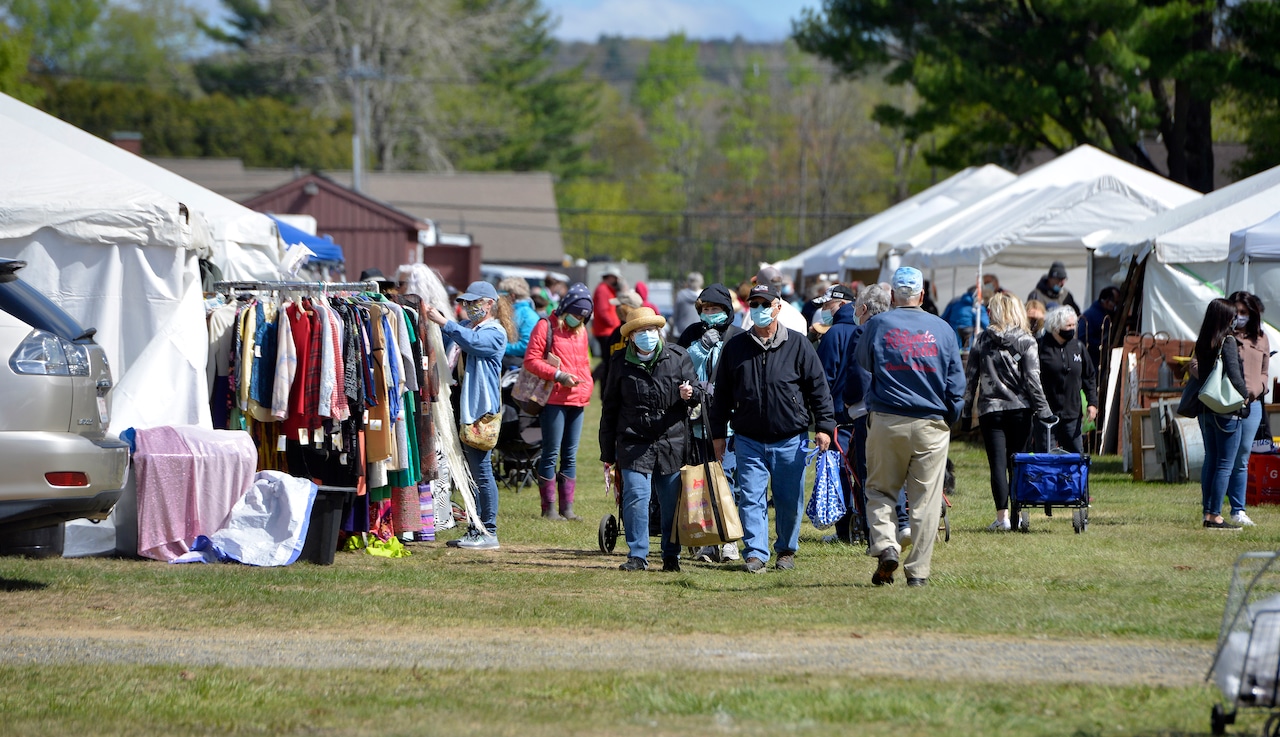
A case being heard by the U.S. Supreme Court on Monday could have ramifications for homeless populations around the country, including in Massachusetts, where high home prices have forced a rising number of people out of their homes.
The case, City of Grants Pass, Oregon v. Johnson, will determine if regulations outlawing camping on public land are unconstitutional when there is no alternative for people without shelter.
While such laws are used by some municipalities to clear homeless encampments under the argument that they are dangerous to public health, advocates say they hurt, rather than help, unhoused people.
“In jurisdictions where encampments exist without interference, that is a policy choice, not a judicial mandate,” attorneys arguing against the camping bans wrote in court documents.
“For years, political leaders have chosen to tolerate encampments as an alternative to meaningfully addressing the wester region’s severe housing shortage,” they continued. “As the homelessness crisis has escalated, (they) have faced intense public backlash for their failed policies, and it is easier to blame the courts than to take responsibility for finding a solution.”
According to court documents, the city of Grants Pass, Ore. implemented a series of ordinances in 2013 that outlawed occupying a campsite on public property, sleeping in a car for two or more consecutive hours overnight and sleeping on public sidewalks and streets at any time.
In 2018, a class action lawsuit was filed against the city challenging these regulations.
The attorneys representing the class wrote that at the time they were passed, city officials made it clear they wished to make the city “uncomfortable” enough that unhoused people would leave entirely.
They argued that because there were virtually no shelter beds available in Grants Pass, homeless residents have no choice but to sleep outside, and therefore these regulations were criminalizing them for the state of being homeless, a breach of the Eighth Amendment protections against cruel and unusual punishment.
In addition, by imposing fines that many homeless people would not be able to afford, the city was only making it more difficult for them to find housing or jobs.
“Any type of criminalizing homelessness never seems to work from a very practical perspective, never mind the moral perspective,” Massachusetts Housing and Shelter Alliance President Joe Finn told MassLive. “Folks get shuffled from town to town and that means that the only place they’d be welcome is in towns that have facilities and resources. We’d much rather see the focus and energy be on developing more housing.”
While the U.S. Court of Appeals for the Ninth Circuit sided with the class, the city appealed to the Supreme Court, arguing that the civil fines imposed by the camping ban did not fall under the Eighth Amendment, which applies to criminal punishment.
They said the ban was essential to addressing homelessness in Grants Pass, and that by requiring shelter to be available to enforce it, the court was putting an undue burden on the city’s resources.
The city would have to keep a daily count of both homeless people and shelter beds, and police officers tasked with removing campers would have to verify that they were “involuntarily homeless.”
“These decisions have erected a judicial roadblock preventing a comprehensive response to the growth of public encampments in the west,” they wrote. “The consequences of inaction are dire for those living both in and near encampments: crime, fires, the reemergence of medieval diseases, environmental harm and record levels of drug overdoses and deaths on public streets.”
While the lower court’s decision did say the anti-camping ordinances were unconstitutional, it specified that the city could still implement “time and place restrictions” on camping, ban tents from public parks or limit the amount of bedding a person can use on public property to avoid encampments, as well as enforce criminal laws.
In Massachusetts in 2022, then-Attorney General Maura Healey ruled that, as advocates in the Grants Pass case have argued, local regulations outlawing camping were unconstitutional.
In a letter to the town of Scituate, which had enacted such an ordinance in an effort to stop people sleeping in vehicles near the town’s marina, she wrote that state law did not allow the punishment of homeless people simply because they are homeless.
“The Scituate by-law, in its current form, does just that,” she wrote. “Because the by-law imposes criminal punishment for sleeping in public spaces, with no required assessment of whether an unhoused person subject to the by-law has adequate alternative shelter, it violates the Eighth Amendment.”
In the letter, Healey cited a lower court decision in the Grants Pass case, which had not yet been petitioned to the Supreme Court at the time.
Since then, some cities in Massachusetts have drawn attention by considering controversial camping bans.
In October, Boston enacted an ordinance allowing police to remove tents and tarps at encampment sites as long as the individuals using them are first offered shelter, transportation and a place to store their belongings, as part of the city’s effort to clear encampments at Mass. and Cass.
The area, short for Massachusetts Avenue and Melnea Cass Boulevard, had long been known for its high concentration of unhoused people, many of whom dealt with substance use.
In the days and weeks after the ordinance went into effect, the city created new shelter beds to accommodate people who had been living there, worked with all of the individuals living there to find places to go, with most ending up in shelters or staying with friends and family, and removed multiple tons of debris that was left behind.
The city had previously conducted sweeps of Mass. and Cass, including more aggressive sweeps in 2021 under former acting Mayor Kim Janey. In that case, unhoused residents were not offered shelter placements. The sweeps prompted a lawsuit from the ACLU of Massachusetts.
Current city Mayor Michelle Wu defended the 2023 sweeps, saying they would help people living there while preventing violence and crime in the area.
“What we are talking about is health, safety, comfort and dignity,” she said at the time. “No one in the city of Boston should be living in a tent on the street, especially as the temperatures fall, with no running water, no heat, the transmission of of illnesses given the conditions living outside exposed to the cold. This is in a city with so many resources. We cannot let that stand.”
More recently, Salem has considered its own anti-camping law, modeled on Boston’s, which would prohibit camping on public property if there are shelter beds available within 15 miles. Anyone violating the rule would be offered a space in and transportation to shelter as well as storage for their belongings.
At a hearing before the City Council Committee on Public Health, Safety and the Environment, Mayor Dominick Pangallo said the main goal of the proposal was to get people into housing.
He brought up the pending Supreme Court case during the meeting, explaining to attendees that thus far, the courts had recognized a constitutional right to camp on public property when shelter beds were not available.
He said including the requirement for an offer of shelter in the ordinance would protect the Salem community in the event the Supreme Court decided otherwise.
“Our hope is to reduce the amount of time that anyone finds himself left out in the elements without any protection,” Pangallo said. “This measure comes from a place of deep community care for our most vulnerable neighbors because we know that every day that an encampment continues is a less healthy, profoundly more dangerous day for its residents than the day before. We should not be okay with letting neighbors sleep on the street.”
During the more than two-hour meeting, many residents testified against the plan, saying the 15-mile radius for determining shelter availability was too wide or that the proposal would result in displacement.
“We do not believe this ordinance is a real solution, but instead one created to manufacture a crime that the unhoused can be found guilty of,” one resident said. “It will displace people from their jobs and support systems, impose significant barriers to obtaining medication and put an already vulnerable population in significantly more danger.”
The committee is scheduled to further discuss the proposed ordinance at its Tuesday, April 23 meeting.
Because the case currently before the Supreme Court deals specifically with bans on camping even when shelter is unavailable, the Boston and Salem regulations would likely not be affected if those bans are found unconstitutional.
The state’s emergency shelter system has been pushed beyond its capacity for months as more and more families, both locals and migrants from other countries, seek help, making it more difficult for communities with camping bans in place to find available shelter into which unhoused people could transition.
- Read more: ‘Anybody home?’ On the hunt with outreach workers documenting homelessness in Springfield
However, if the court allows the bans, it could pave the way for more communities to implement them.
“Places like Boston and Los Angeles and San Francisco where there’s high rates of homelessness, some of these encampment sweeps and other things happening to try to remove people experiencing homelessness from public places are only done with the precedent of, ‘We have shelter that we’re going to offer them,’” Molly Richard, a researcher studying homelessness at Boston University, said.
“If (the court) does rule in favor of Grants Pass, it’ll become a local issue, a state issue, where places around the country will see legislation on the table where local fights will really matter,” Richard continued.
Richard added that programs to get homeless people into housing so they can begin to rebuild their lives frequently end up costing governments the same or even less than emergency response and criminalization policies like campsite removals.
In Massachusetts, about 22,151 people were homeless at the end of 2022, about 7% of whom were unsheltered, according to state data.
While a number of cities and states around the country have written to the court to support the anti-camping laws, Attorney General Andrea Campbell, along with her counterparts in Maryland, Illinois, Minnesota, New York and Vermont, submitted a brief in opposition, echoing the argument that such laws only hurt homeless people.
“If adopted widely, policies criminalizing involuntary homelessness, such as the one that the city has adopted, could render significant portions of the country off-limits for people who are homeless and ultimately undermine governmental interests in public health and safety,” they wrote. “Taking these policies off the table does not interfere with our ability to address homelessness (including the effects of homelessness on surrounding communities) using other policy tools.”





